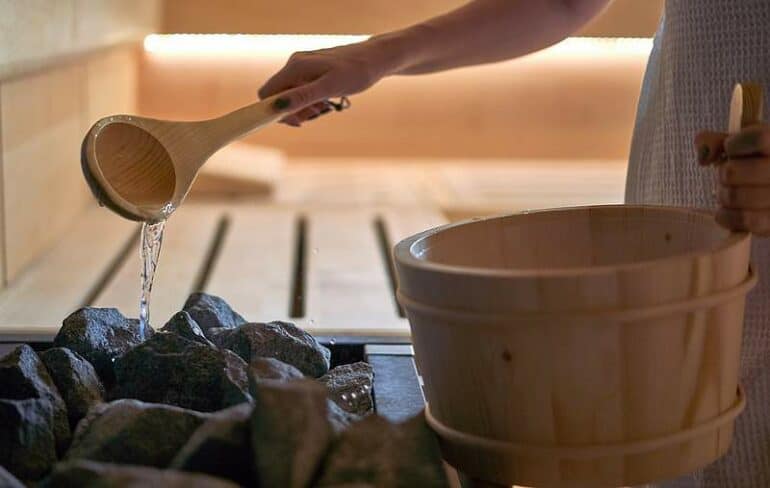Pure relaxation: Why the sauna sometimes makes us tired
The sauna has been known for centuries for its many health benefits, including promoting relaxation, relieving stress, improving circulation and increasing overall well-being. But why do we sometimes feel so sleepy after a sauna session? To answer this question, we need to look at different aspects of sauna therapy and consider scientific explanations.
The effects of heat on the body
The heat in the sauna is a key factor that can explain why we feel so tired after taking a sauna. The high temperatures in the sauna cause blood vessels to dilate and increase blood flow to regulate body temperature. This may cause a temporary drop in blood pressure as blood volume decreases in proportion to the expanded vascular capacity. In response, the body tries to increase blood pressure by making the heart beat faster. This process can cause some strain on the cardiovascular system, resulting in fatigue and exhaustion.
Source: Scientific study: Effects of sauna bathing on cardiovascular function.
The importance of sweating and fluid loss
Another possible explanation for sauna sleepiness is fluid loss through sweating. When taking a sauna, the body loses a significant amount of fluid through sweating, which can lead to dehydration. Dehydration can lead to fatigue and tiredness as the body has to expend more energy to cope with the effects of lack of fluids. For this reason, it is important to drink enough fluids after a sauna session to compensate for fluid loss and avoid dehydration.
Source: Study: Strategies for hydration and fluid replacement during sauna bathing.
The role of endorphins and the sleep-wake rhythm
Endorphins, also known as “happy hormones,” are neurotransmitters that are released in the brain and trigger positive feelings such as joy and relaxation. A visit to the sauna can lead to the release of endorphins, which can contribute to a relaxed and euphoric mood. However, endorphins can also have a calming effect and influence the sleep-wake rhythm.
While endorphins are usually associated with feelings of happiness, they can also have a sedating effect and make you feel tired and sleepy. This could explain why many people become sleepier after a sauna visit. It is also important to note that the timing of saunas can play a role. If you go to the sauna before bed, the increased production of endorphins can make you feel tired and fall asleep more easily.
Source: Scientific study: The role of endorphins in sleep and pain.
The importance of relaxation and stress reduction
One of the main reasons for visiting a sauna is the relaxation and stress relief it provides. The heat and quiet of the sauna can help relax muscles, calm the mind and relieve stress. This can lead to an increased sense of relaxation and put the body in a state of calm.
Stress is known to be one of the main factors that can lead to sleep disorders and fatigue. By relieving stress and relaxing in the sauna, you can calm your mind and prepare your body for a restful sleep. So the combination of heat, relaxation and stress relief in the sauna can make you feel tired and sleep better after a sauna session.
Source: Scientific study: Effects of sauna on sleep
The individual predisposition and personal experience
It is also important to know that reactions to the sauna can vary from person to person. Each person is unique and may react differently to the warmth, stress relief and relaxation of the sauna. Some people feel extremely tired after a sauna session, while others notice little change in their sleepiness.
Personal experience and individual predispositions may play a role in how strongly sauna fatigue is felt. Some people also feel energized and refreshed after a sauna session, while others feel tired and exhausted. It is important to know that reactions to sauna use can vary from person to person and depend on many factors, such as individual disposition, physical health and personal condition. These include, for example, the duration and temperature of the sauna session. A longer stay in a hot sauna can lead to greater fatigue. Likewise, a higher temperature in the sauna can cause the body to have to work harder to cool down, which can lead to exhaustion and fatigue.
It should also be noted that the body’s water and electrolyte balance can be affected when taking a sauna. Sweating in the sauna causes the body to lose water and important electrolytes such as sodium and potassium, which are necessary for optimal body function. An imbalance in these areas can lead to fatigue and exhaustion.
Source: Scientific study: Sauna-induced body fluid loss and its effects on physical performance.
The importance of hydration and rest
To counteract drowsiness in the sauna, it is important to ensure adequate hydration and rest. Drink plenty of water before, during and after the sauna session to compensate for fluid loss and restore the body’s water and electrolyte balance. Adequate hydration can help reduce fatigue and exhaustion.
It is also important that you give your body enough time to recover. Do not overexert yourself in the sauna, and give your body enough rest and recovery to avoid possible exhaustion. After your sauna session, plan enough time for relaxation and rest to rejuvenate yourself.
Source: Scientific study: Effects of sauna on cardiovascular health.
Conclusion
Sauna sleepiness is an interesting phenomenon that many people experience after a sauna session. There are several factors that can contribute to feeling sleepy after a sauna session, including the release of endorphins, stress reduction and individual disposition. It is important to know that reactions to sauna sessions can vary from person to person and depend on many factors.
To counteract sauna drowsiness, it is important to ensure adequate hydration and rest. Drink enough water and give your body enough rest and recovery after the sauna session. Listen to your body and pay attention to how it reacts to the sauna session.

